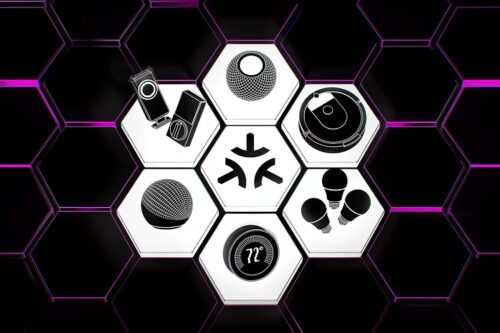
10.4.22 – The Verge
The smart home standard is open for certification at last. We could see Matter devices in our homes as soon as this month.
he Connectivity Standards Alliance has released the final Matter 1.0 standard and announced that the certification program is now open. An official Matter launch event is scheduled for November 3rd, but the first Matter devices could show up any day now. Companies can start selling Matter devices or upgrading existing ones as soon as they’re certified.
When the idea of Matter was first floated in 2019, there were a lot of people (myself included) who thought it would never happen. Apple, Google, Amazon, and Samsung sitting at a table together and coming up with a plan to fix the fractured smart home? Fierce competitors in the manufacturing space, such as lock makers Yale and Schlage and light makers Philips Hue and GE Lighting, developing a universal standard that would make their products work together in any ecosystem? It sounded like a pipe dream. And as the delays piled up, it sometimes felt like Matter would never arrive.
%2Fcdn.vox-cdn.com%2Fuploads%2Fchorus_asset%2Ffile%2F24081250%2FFinal_CSA___Matter_1.0_Launch_Graphic.jpg&w=2400&q=75)
But today, Matter certification labs are up and running, the SDK is complete, and companies can start manufacturing, upgrading, and getting the official Matter stamp of approval for their devices.
While the specification has only just been finalized, several companies were working on Matter-compatible products as part of an early access program, which means we could start to see Matter devices any day now. “We had a strong group of companies that participated in our testing process,” Michelle Mindala-Freeman of the CSA told The Verge. “These will be among the first products to be branded and available as Matter.”
The Matter launch event scheduled for November 3rd will likely have some of these early products on show. The invitation indicates there will be a demo area where companies can showcase their Matter-certified products.
A universal connectivity standard, Matter is designed to make smart home devices simpler. By giving your door lock and light bulb a way to talk directly to each other, either over Wi-Fi or a newer protocol called Thread, Matter should make the smart home faster and more responsive. It should also enable an easier setup process, with compatible devices automatically showing up on your smartphone to allow you to connect them. Plus, with a common language that’s local to your home and doesn’t rely on the cloud, your devices can be controlled by more than one smart home ecosystem or voice assistant.
This isn’t a quick fix, however, as the initial Matter spec only covers a limited number of device categories. The CSA has said it is developing specifications for more devices — including popular categories such as security cameras and robot vacuums. But at launch, the compatible devices will be limited to smart light bulbs and fixtures, smart plugs and switches, smart thermostats and other HVAC controls, smart shades, smart sensors, connected locks, and media devices including TVs.
%2Fcdn.vox-cdn.com%2Fuploads%2Fchorus_asset%2Ffile%2F24081076%2FGoogle_Matter._png.png&w=2400&q=75)
The first rollout also includes Matter controllers and bridges, which are devices such as the Google Nest Hub Max and Amazon Echo smart speaker that can act as both a conduit for devices to talk to each other and as an interface for you to control your devices using voice or a touchscreen interface.
Smartphone apps such as the Google Home app and the Apple Home app will also be Matter controllers. Bridges can also be Matter certified to bring their connected products into the Matter ecosystem. For example, Signify, owner of Philips Hue, has said its smart lighting control bridge will be upgraded to Matter, allowing its lights to be controlled by any Matter controller without the lights being updated.
%2Fcdn.vox-cdn.com%2Fuploads%2Fchorus_asset%2Ffile%2F24081088%2FMatter_Image_Amazon.jpg&w=2400&q=75)
The CSA also says Matter is designed to be secure using technology that ensures devices have to confirm who they are and where they are from before being allowed on the network. In terms of privacy, Matter operates entirely locally over IP, but it doesn’t rely on an internet connection to run. However, it is designed to talk to the cloud easily. Those conversations are controlled by the ecosystem app or device app you use and, in turn, governed by their individual privacy policies. So, it will still be important to only use devices and services from companies you trust with your data.
There has been a lot of confusion and questions about how Matter devices will work in our homes. With the release of Matter and the opening of the certification program, it looks like we will soon find out.
